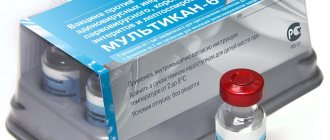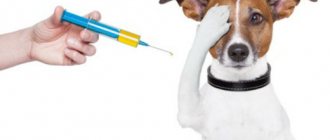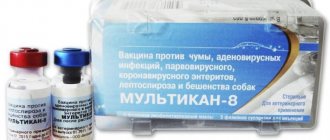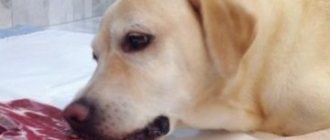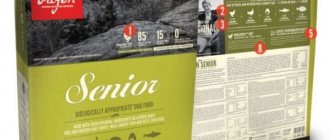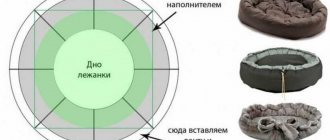Dogs have always been and remain one of their most beloved pets; for many centuries they have served people faithfully. Unfortunately, they also get sick sometimes. Often these illnesses turn out to be very serious, threatening the life of the animal. And to prevent this from happening, their caring owners come to the rescue. They are concerned that their pet is vaccinated on time and that the most optimal option is chosen with maximum effectiveness and a minimum of side effects. One of these products is the Multikan vaccine from domestic manufacturers.
Purpose of application and general information
The vaccine is being produced in the Russian Federation.
The main producers are Biokhim LLC and NPO Narvak. The package contains two ampoules with dry and liquid components used to prepare the solution.
The drug is used to prevent diseases in dogs such as rabies, enteritis, plague, leptospirosis and others.
Possible adverse reactions
As with any medical procedure, there is a small chance of side effects. In most cases, the risks are much less than the incidence of the disease itself. Most dogs respond very well to the drug, but serious side effects or allergic reactions of varying severity are possible. In case of negative symptoms, you should contact your veterinarian.
The reasons for the negative consequences of vaccination are very common:
- incorrect injection or incorrect vaccination schedule;
- hypersensitivity to the components of the drug;
- weak immune system of the animal.
In case of negative symptoms, it is necessary to contact a veterinarian, as there are various acute reactions leading to death.
The most common side symptoms are:
- apathy;
- lethargy;
- loss of appetite;
- fever;
- vomiting and diarrhea;
- pain at the injection site;
- abscess;
- mouth swelling and drooling;
- aggressiveness;
- local irritation;
- abnormal coordination.
If your dog experiences any of these signs, you should contact your veterinarian and ask for a change in vaccine in the future. It should be emphasized that very severe allergic reactions occur relatively rarely.
Description of the vaccine
Multikan is divided into several varieties - 4, 6, 8. The distinctive features of each type of product lie in their ability to prevent the occurrence of a different number of pathological processes.
Vaccine number 8 is considered one of the more popular ones, since with its help it is possible to prevent the development of most diseases in your four-legged friend.
The drug contains live viruses that contribute to the occurrence of pathologies dangerous to dogs.
There are very few pathogens in the product, and the animal does not become infected with them, but a stable immune system is formed.
In case of infection with a virus after vaccination, lymphocytes give an appropriate response to a familiar infection and prevent its further reproduction. It may be that the available antibodies are not enough to prevent the development of a possible disease.
Over time, the death and disappearance of the injected antibodies is noted. Their effect sometimes reaches up to 2-3 years, in some cases no more than three weeks.
The timing is influenced by indicators such as:
past illnesses;- age of the animal;
- bearing puppies and other physiological characteristics.
To prevent unwanted problems, veterinarians recommend strictly adhering to the established vaccination schedule.
Multikan is not a medicine. It is used not for treatment, but for the prevention of disease. Vaccination is carried out only for healthy animals.
Reviews about Multikan
- Victor, Rostov region.
I have been professionally breeding dogs for ten years, the last six of which I have given preference to Multikan. This happened because in the case of the imported drug, a deterioration in the well-being of animals began to be recorded. The veterinarian recommended Multikan. Excellent result. The biggest “sorrow” was when the puppy developed characteristic swelling and slight pain at the injection site; within a week they were gone without a trace. All dogs were active after the procedure; there were no cases of disease after vaccinations.
- Oksana, Moscow.
Read. Vaccine "Kokav"
I bought a Yorkshire Terrier. Fortunately, he had already been vaccinated for the first time, so he lived peacefully for a whole year, enjoying how this little “lump” was slowly growing. However, the time for revaccination has come. Of course, I was very worried, but I went to the vet on time. The specialist said that this was the first time I was injected with Multikan, so it is advisable not to change the drug.
In general, my Marquis tolerated the vaccination well, although he was a little “cranky” and whining until the end of the day. But the next day everything was forgotten, the pet was playful and cheerful.
- Denis, Voronezh.
For my 16th birthday, my parents gave me a cocker spaniel. My happiness knew no bounds, but along with joy came a lot of worries. The most important of them is to protect your little friend from diseases. The veterinarian prescribed Multikan: they say it is a good drug, does not cause allergies, and is well tolerated. I decided to support our manufacturer. And I don’t regret it! I’ve been vaccinating them for six years now - no allergies, the dog is healthy and full of energy.
Dosage form
The packaging of the drug includes a bottle with a dry substance and an ampoule with a liquid component. The first is a lyophilized mass of a yellowish tint, the second is a pink suspension for preparing a solution.
The volume of both types of compositions is 1 and 2 ml, respectively.
Products must be used immediately after opening within 15 minutes.
If the expiration date has expired, improperly stored, the packaging is damaged or there is no labeling, the drug must be disposed of by boiling.
Diseases that the drug can prevent:
| Disease | Multikan-4 | Multikan-6 | Multikan-8 |
| Plague | + | + | + |
| Adenoviral infections | + | + | + |
| Coronavirus enteritis | + | + | + |
| Parvovirus enteritis | + | + | + |
| Leptospirosis | – | + | + |
| Rabies | – | – | + |
Depending on what type of drug is used, different amounts of viral and infectious pathogens can be suppressed.
In what cases can a veterinarian prescribe the drug?
The drug is not a drug, it is used as an injection against viral diseases.
The product is administered to healthy animals to establish lasting immunity against dangerous viruses. Vaccination is carried out not only in puppyhood; the effect of injections must be maintained throughout the pet’s life.
We recommend that you read the article: “Everything you need to know about vaccinating dogs.”
How to use
To prevent the development of complications, avoid mistakes, and give the injection correctly, you must follow some recommendations intended for both the specialist and the animal owner.
Preparing your pet
Two weeks before the procedure, the dog must be treated for worms. Before administering the medication, the body temperature of the four-legged friend is measured. Normal values are +37.5…+39.5 °C. To prevent an allergic reaction, an antiallergic drug is administered.
Injections must be made under sterile conditions with pre-treated devices.
Mixing components
Using a syringe, add the liquid part to the bottle with the dry mixture and shake thoroughly.
According to the instructions for use, injections are administered subcutaneously into the neck, scruff of the neck, or intramuscularly into the inner thigh.
In order for the drug to be better absorbed, it is recommended to preheat the liquid part to +36 °C. This measure helps prevent the formation of bumps and swelling.
Before administering the vaccine, the injection site and needle are treated with an alcohol solution.
Vaccination schedule and dosage
When developing a vaccination schedule, the age of the pet must be taken into account. The first multi-vaccination is given at the age of 2-2.5 months, it is repeated a month later (the first vaccination includes 2 procedures). Revaccination is carried out at approximately 12 months.
To protect an adult animal from a dangerous disease, vaccinations are given every year in the future.
For puppies and small breed dogs, a single dose is 1 ml of the drug, for large pets – 2 ml of solution.
Personal Safety Measures
When working with Multikan, you must wear protective gloves, a robe, and trousers. If the substance gets on an unprotected area of the skin or mucous membrane, it is immediately washed off with plenty of running water.
In the event of a vaccine spill, the surface is treated with a solution of chlorine or sodium.
If the product is accidentally administered to a person, the injection area is wiped with alcohol. Urgent assistance from a specialist is also required.
After care
Dogs must be kept in quarantine for 14 days after vaccination, especially young animals that are being vaccinated for the first time. You can walk with the puppy only in your arms, but avoid contact with other pets.
If an adult animal has been vaccinated, it is allowed to walk it on a leash, limiting contact with strangers.
You should also not allow your pet to become overworked or the weakened body to become hypothermic.
Veterinarians do not recommend bathing the animal after the vaccine, which can provoke the development of unpleasant consequences and complications.
STORAGE CONDITIONS
In a dry, dark place at a temperature of 2 to 8 °C. Shelf life of Multikan is 6 - 18 months.
Published canine vaccination guidelines allow the clinician to implement protocols designed for individual patients that provide protective immunity at appropriate life stages.
However, the protocols used in practice usually require the owner to comply with the recommended ideal Multican 6 vaccination schedule.
This article discusses immunization options for dogs. Remember, however, that the recommendations outlined are largely based on expert opinion; Published scientific research on revaccination requirements is limited.
- Core vaccines except rabies: 3 doses from 6 to 16 weeks of age
- Rabies vaccine: single dose at least 12 weeks of age
Indications and contraindications for use
The medicine is administered to young and adult individuals according to the vaccination schedule in order to form immunity against a number of dangerous infectious and viral diseases.
Vaccination is performed only under the supervision of a specialist. 7 days after receiving the vaccine, it is recommended to take your pet for examination to a veterinarian.
Despite the fact that the drug is considered safe for the health of the animal, before using it it is necessary to exclude any restrictions. If you neglect this rule, the likelihood of developing unwanted complications increases, which can be fatal for your four-legged friend.
It is prohibited to vaccinate a dog in the following situations:
disease;- pregnancy;
- rehabilitation period after childbirth, surgery;
- time required for teeth replacement;
- planned operation.
The introduction of a vaccine if contraindications are ignored may be accompanied by an increase in body temperature, exacerbation of existing or the appearance of new pathological processes.
Personal prevention measures
- When working with the vaccine, you should follow the general rules of personal hygiene and safety precautions provided for when working with veterinary medicinal products.
- All persons participating in vaccination must wear special clothing (robe, trousers, hat, rubber gloves). Places of work must have a first aid kit.
- If the vaccine gets on the skin and/or mucous membranes, it is recommended to rinse them with plenty of tap water.
- In the event of a vaccine spill, fill the contaminated area of the floor with a 5% solution of chloramine or sodium hydroxide.
- If the drug is accidentally administered to a person, the injection site must be treated with a 70% solution of ethyl alcohol, contact a medical facility and inform the doctor about this.
Are there analogues
The Multikan product has several similar drugs that have minor differences in composition.
Among the most popular are:
Biocan;- Eurikan;
- Vanguard;
- Hexadog;
- Nobivak.
There are also other means. What to choose is decided directly by the owner of the animal.
Vaccination stages
Vaccination should occur in several stages:
- Dilution of the drug. The vaccine should be checked to ensure it was properly transported and stored at the temperature stated on the label. After mixing, draw the solution into a syringe and remove excess air bubbles by tapping on the side of the syringe. The needle should be pointing upward.
- Preparing your pet. You should make sure that the dog is clean and there is no visible dirt on the skin around the neck. You need to lift some of your pet's skin near the neck to pinch. This will provide a certain space under the skin where the drug can be injected.
- Carrying out the injection. You should carefully pierce the skin with a needle and insert a syringe. Slowly pressing the plunger of the syringe, inject the Multikan 4 vaccine.
Attention! If blood is visible in the needle, then you need to find another place to inject. This means that there was a hit in a blood vessel, and you cannot inject there.
- Removing the needle. As soon as the needle is pulled out, you need to press your fingers on the injection site and hold them for about 30 seconds. This will prevent bleeding. Place the needle and syringe in an appropriate waste container or glass jar, which should be disposed of at the veterinary clinic.
